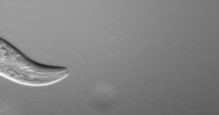 Video of C. elegans from Wikipedia. https://upload.wikimedia.org/wikipedia/commons/b/be/CrawlingCelegans.gif
Video of C. elegans from Wikipedia. https://upload.wikimedia.org/wikipedia/commons/b/be/CrawlingCelegans.gif
A new study conducted by researchers at Northwestern University examined the costs of reproduction in roundworms, otherwise known as C. elegans. They discovered that male roundworms can send two kinds of pheromones that prime females for reproduction. One type of pheromone they studied sparks the onset of puberty in young female worms while the other prolongs fertility in aging females. The problem is that these changes come at a cost as it shortens the lifespan of female roundworms.
According to the study authors, a similar effect has been seen in mammals where a pheromone can change when females become sexually mature.
Since this effect appears common to roundworms and mammals, these findings raise the possibility that something similar might happen with humans. Thus the hope is to apply these findings to humans in an effort to prolong fertility...although I am not sure women would seek out this treatment if it increased aging.
Source:
Aprison EZ, Ruvinsky I. Sexually antagonistic male signals manipulate germline and soma of C. elegans hermaphrodites. Current Biology, 2016 DOI: 10.1016/j.cub.2016.08.024
